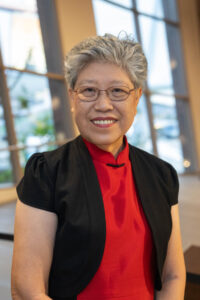 Vivien Goh is a world-renowned violinist, an alumna of the Eastman School of Music (Class of ’69), and a member of the University of Rochester’s Global Leadership Council. She will be in Rochester during Meliora Weekend 2024, which takes place from September 26-29.
Vivien Goh is a world-renowned violinist, an alumna of the Eastman School of Music (Class of ’69), and a member of the University of Rochester’s Global Leadership Council. She will be in Rochester during Meliora Weekend 2024, which takes place from September 26-29.
Global Rochester recently had a Q&A with her about her journey from Eastman to becoming a conductor, educator, and global leader. Below are some highlights from our conversation.
What inspired you to choose the University of Rochester’s Eastman School of Music?
My father had been on a State Department tour a few years earlier and had visited Eastman, where he met Howard Hanson and some of the faculty. Since I was only 17 and making my way alone from halfway across the globe, my parents felt that Eastman offered the ideal environment where I could focus on my passion for music.
How did your education at the Eastman School of Music shape your approach to music and performance?
My experiences in the Eastman Orchestras, playing under various conductors and composers like Stravinsky and Khachaturian, deeply influenced my career as a conductor of the Singapore Youth Orchestra. Additionally, my time in the Eastman Honors Quartet honed my chamber music skills. The Suzuki Method was first introduced at Eastman while I was there, and I incorporated its principles in my teaching. Listening to great musicians “live” during that time was also a tremendous inspiration.
My experiences in the Eastman Orchestras, playing under various conductors and composers like Stravinsky and Khachaturian deeply influenced my work as a conductor of the Singapore Youth Orchestra.
During your time at Eastman, was there any professor who particularly influenced you? Could you share a memorable story about your experiences with them?
I was greatly influenced by the conductors, guest conductors, and composers I encountered at Eastman, including Stravinsky and Khachaturian. My violin professor, Millard Taylor, was both a performer and a dedicated teacher—a true role model for me. I admired his thoughtful approach to interpreting the violin repertoire. My chamber music coach, John Celentano, on the other hand, was flamboyant and witty. As a member of the Honors Quartet, I spent much time learning the craft and love of chamber music under his guidance. His influence remains with me to this day. I also appreciated conductor Willis Page’s expertise in shaping the orchestras at the school.
Plan and prepare yourself for a multi-faceted career. A musician has many opportunities, not only on stage or in the classroom, but in areas where your skills can contribute to society.
Given your extensive experience in both performing and teaching, what key skills do you believe are essential for emerging musicians who are looking to excel in the classical music scene?
To excel as a musician today, it is important to not only master technical skills but also have a deep understanding of the life and times of composers to interpret their works for our era. People skills are equally important, as musicians must interact with many non-musicians essential to the business. Additionally, one should be aware of how multimedia can enhance performances in certain contexts.
What advice would you give to recent graduates of Eastman who are looking to establish a career in music?
Plan and prepare yourself for a multi-faceted career. A musician’s opportunities extend beyond the stage or classroom—look for ways your skills can contribute to other areas of society
What resources or opportunities offered by the university were most beneficial to you in achieving your goals?
The Sibley Library, with its vast collection of music scores and audio recordings, was an invaluable resource. Performing in the Eastman Theatre and Kilbourn Hall was also thrilling. In my senior year, I was loaned a precious Italian violin—a G.B. Guadagnini—which was a significant milestone in my musical journey.
Have you maintained connections with fellow alumni, and if so, how have these connections benefited you personally or professionally?
Through my involvement with the Global Leadership Council, I’ve remained connected to the University. Being part of the alumni community broadens your horizons, as it connects you with people from different faculties and professions. I also enjoy mentoring young students and guiding them toward fulfilling their aspirations. My classmates have contributed to my work—Robert Goodberg and Bill Blossom gave classes to my students in the Singapore Youth Orchestra, while Kathryn Hoffer suggested repertoire for children’s concerts. These connections continue to benefit me professionally.
How do you stay connected with your alma mater and other alumni?
I enjoy many of the live-streamed concerts from Eastman and webinars on various topics. Serving on the Global Leadership Council also keeps me engaged with the University. It is fulfilling to help future students experience the same opportunities I had at the University.
Feel free to share any additional insights or advice with us!
My time in Rochester had a profound influence on my life, and I wanted to share that experience with aspiring young musicians in Singapore. Although I am far from Rochester, I appreciate the University’s strong online presence, which allows me to stay connected through livestreams and Zoom events.
Photo credit: Gilbert Chan
